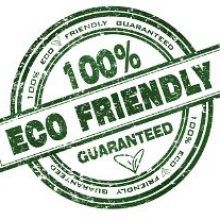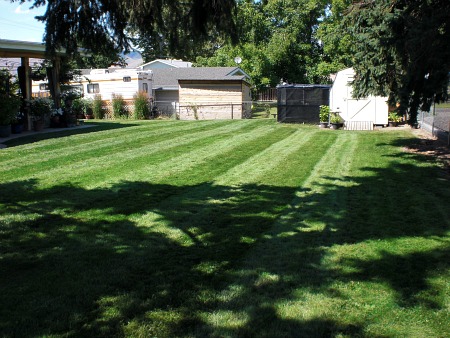Natural organic lawn care promotes the use of naturally occurring resources while excluding the use of synthetic fertilizers and pesticides. The term organic is widely recognized as meaning a naturally occurring material derived from living organisms or their by-products.
Let’s get technical because this is important to understand…
Organic compounds are materials that contain carbon and hydrogen. These compounds can be found in nature or synthesized in the laboratory. Composted manure, bone meal, corn gluten meal and fish emulsion are examples of natural organic fertilizers. Synthetic fertilizers such as urea, IBDU and urea formaldehyde are also organic compounds. However, these man-made compounds are called synthetic organic fertilizers.
Natural organic lawn care is a better term to use when referring to lawn maintenance that does not use synthetic products.
Incorporating natural products is an important component of sustainable lawn maintenance and boosts the health and environmental benefits of lawns. The key to growing healthy, environmentally safe lawns is following best management practices: proper mowing, watering, fertilizing, soil enhancement and integrated pest management.

What we cover
ToggleNatural Lawn Maintenance Tips
10 organic lawn care tips revolving around sound maintenance practices. We call it “preventive health care for lawns”. It’s the simplest way to grow a lush green natural lawn without chemicals.
Natural Lawn Fertilizer
Natural fertilizers add organic matter to the soil and stimulate microbial activity. They are slow release, reducing the chances of salt damage (burn) to grass plants and reducing the chance of nutrients polluting waters by runoff or leaching.

Compost Tea
Compost Tea is a liquid extract of compost that contains beneficial soil microbes and nutrients. It is made by placing compost into a permeable bag (tea bag) and soaking it in water for 24 to 48 hours. The solution is then sprayed onto lawns and landscape plants.
There is a lot of debate surrounding the use of compost teas in organic lawn care and landscaping. Enthusiasts say it is better than “plain old compost” and claim compost tea will control plant diseases, improve soils, and eliminate synthetic fertilizer and pesticide use. On the other hand, the “Garden Professors” from top research universities question the scientific data and lack of research backing up these claims.
Natural Pesticide Options for Organic Lawn Care
When it comes to battling pests, there are some cultural and biological options that can be used. However, your best chemical-free defense against a pest invasion will always be a vigorous, well-managed lawn.
Natural Weed Killers
- The ultimate chemical-free weed control program.
- One option for organic weed control is vinegar-based herbicides. You can find a recipe for vinegar weed killer on many organic gardening sites that use food-grade vinegar. However, horticultural vinegar is much more effective.
Natural insecticides and biological insect controls
- Parasitic nematodes are an effective, non-chemical answer to a wide range of lawn and garden problems!
- Use beneficial insects to control weeds. Puncturvine (a.k.a Goatheads) is a noxious weed. Visit Goatheads.com to discover how to use Puncturevine Weevils to control this harmful weed.
- Japanese beetles will wreak havoc as they feed on your garden and landscape plants. Milky Spore is a biological control that targets Japanese beetle grubs. How effective is Milky Spore? Should you use it to protect your lawn?
- Spinosad is a natural insecticide used to control caterpillars, fleas and red ants in lawns. Use it to control beetles, worms, caterpillars, leafminers, thrips and spider mites around your garden.
Lawn Maintenance Calendar
Here’s a sample organic lawn care maintenance calendar to help you plan your safe, chemical-free lawn.
This natural lawn was maintained using good lawn maintenance: proper mowing, watering, fertilizing, aerating and overseeding. The homeowners had two large dogs and the yard got a lot of foot traffic, however with good maintenance we were able to grow a very nice lawn.

